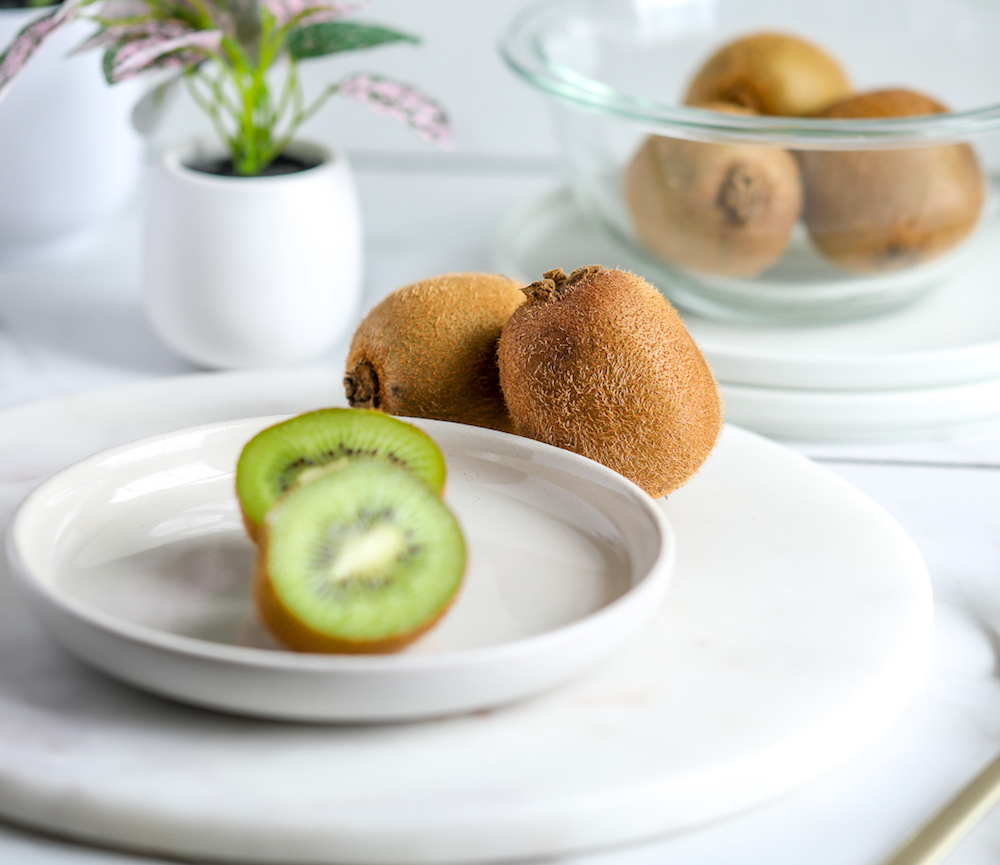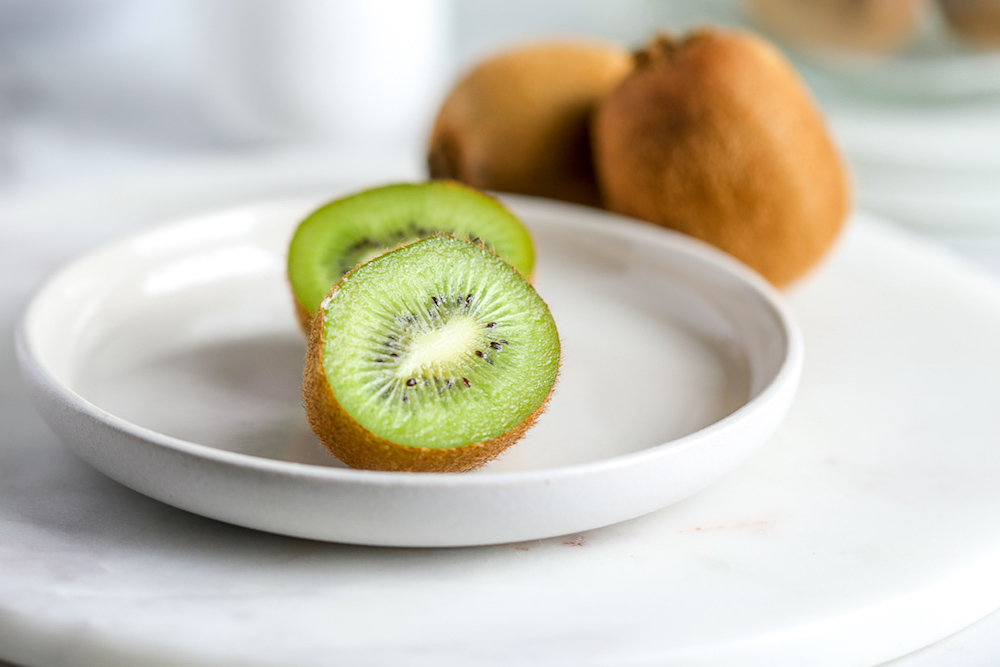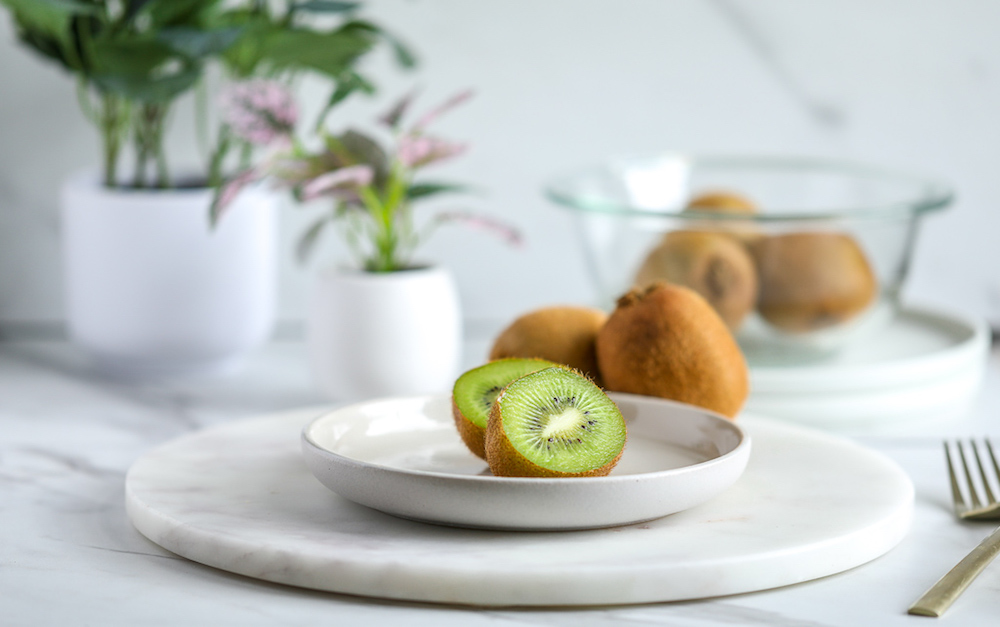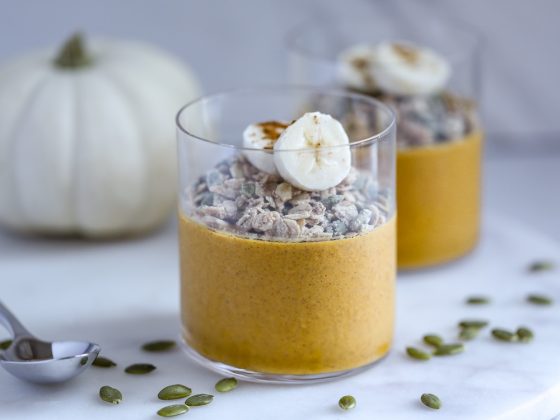Thanks to a very specific pregnancy craving, I found myself buying kiwi at the grocery store for the first time in forever. Being the nutritional nerd that I am, I wanted to dive into the fruit’s health benefits (I later learned kiwi is a great source of folate, a necessary nutrient for a healthy pregnancy – how cool is that?). I like to turn to the science, and I was happy to realize there is a good amount of research on kiwi. The health benefit that stuck out to me the most at first glance was how eating kiwi before bed supports sleep quality on a number of metrics: sleep onset latency (how long it takes to fall asleep), total sleep time, and sleep efficiency (the ratio of total sleep time to the amount of time dedicated to sleep). My curiosity, coupled with the fact that I have been struggling with sleep for years, caused me to dig a little deeper. Here is what I found out about the connection between kiwi consumption and sleep.
The nutritional benefits of kiwi
First, it is important to note that there are many beneficial compounds found in kiwi that make it a positive nutritional choice, whether you want to incorporate it into your diet for sleep related issues or not. The fruit is considered a functional food, and for good reason. Not only is it very high in vitamin C, but kiwi is also a great source of fiber, potassium, vitamin E, and folate. It also includes numerous antioxidants, phytonutrients, and enzymes. Consuming kiwi can be an effective way to aid digestion, but is also beneficial for metabolism, balancing blood sugar, heart health, and of course, supporting sleep.
Why kiwi could support sleep quality
Multiple studies have concluded that consuming kiwi before bed supports sleep quality in numerous ways. In one study, 24 participants (22 being females) ate two kiwis one hour before bed. After four weeks, both sleep onset latency and wake time after sleep onset decreased, while total sleep time and sleep efficiency both increased. These results show an improvement in various sleep patterns when eating kiwi. Another study looked at 15 elite athletes, since athletes tend to experience sleep issues (certain lifestyle factors can lead to disruptions in circadian rhythms, increased emotional stress, and increased and physical stress which all affect sleep). Again, after a four-week intervention, results showed similar improvements in sleep patterns (total sleep time, sleep efficiency, sleep onset latency, and wake time after sleep). Additionally, post-exercise recovery scores also improved. In other words, the participants noted decreased exercise-induced stress and increased training stress balance (a measure of readiness and fatigue) the following day, enhancing their training capabilities as a result.
The question remains: what is it about kiwi specifically that helps improve sleep quality? In addition to the nutrients mentioned above, kiwi also contains both melatonin and serotonin; melatonin (the sleep hormone) aids in circadian rhythm regulation, and studies show serotonin plays a role in sleep quality (not to mention that serotonin is a precursor to melatonin production). Additionally, the antioxidant content found in kiwifruit works to decrease inflammation (which helps with sleep especially in very active individuals). Research has also suggested that nutrients such as folate, vitamin C, and vitamin E – all found in kiwi – play an active role in improving sleep quality. Interestingly, when a study looked at whether consuming dried kiwi improved sleep and mood, the results were the same.

Other health benefits of eating kiwi
Aside from sleep, research shows that consuming kiwi comes with a whole host of other health benefits.
Digestion
Thanks to both its natural enzymes and dietary fiber content, consuming kiwi supports digestion and overall gut health. Kiwi is also a source of prebiotics, which supports digestive health by feeding the gut’s good bacteria.
Immunity
Known for its very high vitamin C content, kiwi is a great fruit to incorporate into your diet for its immunity-strengthening properties. And while vitamin C is an essential nutrient for a number of reasons and biological processes, we must obtain it through food. Not only is vitamin C necessary for a healthy functioning of the immune system, but it also protects the body against pathogens, decreases inflammation, fights oxidative stress, and contributes to collagen formation. Vitamin E – also found in kiwi – is a nutrient that plays an important role in immune function as well, especially when it comes to warding off infection and preventing oxidative stress. These two vitamins together provide a powerful immune-boosting punch.
Metabolism
Consuming kiwi supports metabolic health primarily through blood sugar balance. Not only is kiwi a low GI food with a high fiber content, but studies have shown that is an acceptable fruit for the diets of those individuals with a low glucose tolerance. Adding kiwi to a meal has even shown to reduce the post-prandial (post-meal) glycemic response. This effect is likely due to the dietary fiber, but also the unique carbohydrate make-up of the fruit’s cellular walls. Additionally, kiwi improves metabolism indirectly by increasing microbial diversity and the beneficial bacteria in the gut. Studies have concluded that there is a connection between our microbiota and metabolism.

Key takeaways and action steps
The research studies pertaining to kiwi consumption and sleep that I came across were limited to eating the fruit one hour before bed. If improving the quality of your sleep is the main goal, I would experiment with eating one or two at night. However, incorporating kiwi into your diet no matter the time of day will prove beneficial. If you tend to limit your fruit intake for better blood sugar control – fear not. It is a fruit known for its low glycemic index and could actually help to improve glucose regulation. Add kiwi slices to your smoothie, top them on your breakfast bowl, or add a fruity flare to your salads. You can’t go wrong! And remember, even dried kiwi has demonstrated similar benefits, although a Healthified suggestion would be to stick to the fruit in whole food form to keep sugar content low and reap the most benefits.










